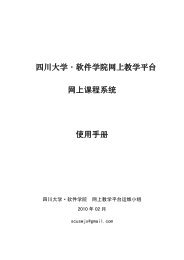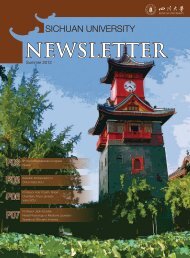Reflexive inquiry in organizational research: Questions and ...
Reflexive inquiry in organizational research: Questions and ...
Reflexive inquiry in organizational research: Questions and ...
You also want an ePaper? Increase the reach of your titles
YUMPU automatically turns print PDFs into web optimized ePapers that Google loves.
Human Relations<br />
[0018-7267(200308)56:8]<br />
Volume 56(8): 983–1003: 036988<br />
Copyright © 2003<br />
The Tavistock Institute ®<br />
SAGE Publications<br />
London, Thous<strong>and</strong> Oaks CA,<br />
New Delhi<br />
www.sagepublications.com<br />
<strong>Reflexive</strong> <strong><strong>in</strong>quiry</strong> <strong>in</strong> <strong>organizational</strong><br />
<strong>research</strong>: <strong>Questions</strong> <strong>and</strong> possibilities<br />
Ann L. Cunliffe<br />
ABSTRACT<br />
Over the last 20 years, social science scholars have challenged<br />
conventional conceptions of social reality, knowledge, <strong>and</strong> the validity<br />
of our methods of <strong><strong>in</strong>quiry</strong>. Many have criticized the aim of ma<strong>in</strong>stream<br />
social science to provide an absolute, objective view of the<br />
world <strong>and</strong> have called for a reflexive stance <strong>in</strong> which we recognize<br />
all social activity, <strong>in</strong>clud<strong>in</strong>g <strong>research</strong> itself, as an ongo<strong>in</strong>g endogenous<br />
accomplishment. Three ma<strong>in</strong> themes have emerged: a crisis of<br />
representation, an emphasis on the constitutive nature of language,<br />
<strong>and</strong> a call for reflexive approaches to <strong>research</strong>. Contemporary<br />
<strong>organizational</strong> theorists have found themselves drawn <strong>in</strong>to the<br />
debate <strong>and</strong> struggl<strong>in</strong>g with a number of questions around how to<br />
carry out reflexive <strong>research</strong>. I exam<strong>in</strong>e those questions <strong>and</strong> explore<br />
the implications for <strong>organizational</strong> <strong>research</strong>. In do<strong>in</strong>g so, I attempt to<br />
enact reflexivity through one layer of narrative circularity.<br />
KEYWORDS<br />
radical reflexivity reflexive <strong>research</strong> practice representation <br />
social constructionism<br />
The notion of reflexivity, or a crisis of truth, has emerged with<strong>in</strong> many discipl<strong>in</strong>es:<br />
philosophy (Derrida, 1976; Heidegger, 1966), l<strong>in</strong>guistics (de Saussure,<br />
1959; Wittgenste<strong>in</strong>, 1953), the natural sciences (Ashmore, 1989; Latour,<br />
1988), anthropology (Clifford & Marcus, 1986), sociology (Bodily, 1994;<br />
Garf<strong>in</strong>kel, 1967; Gouldner, 1970; Pollner, 1991), psychology (Gergen &<br />
Gergen, 1991; Shotter, 1992), <strong>and</strong> comparatively recently <strong>in</strong> organization<br />
983
984<br />
Human Relations 56(8)<br />
<strong>and</strong> management studies (Alvesson & Sköldberg, 2000; Calás & Smircich,<br />
1999; Cooper, 1990; Watson, 1995). Essentially, reflexive scholars question<br />
the threads of philosophical <strong>and</strong> methodological certa<strong>in</strong>ty implicit <strong>in</strong> the goal<br />
of ma<strong>in</strong>stream social science to provide an absolute view of the world. They<br />
suggest that all forms of <strong><strong>in</strong>quiry</strong> are paradigmatically circumscribed (Burrell<br />
& Morgan, 1979; Chia, 1996b), <strong>and</strong> therefore truth claims, assumptions<br />
about reality <strong>and</strong> the ways <strong>in</strong> which we generate accurate theories should be<br />
challenged to reveal the <strong>in</strong>herent <strong>in</strong>stability of knowledge. Much of the<br />
debate surround<strong>in</strong>g reflexivity focuses on philosophical issues about the<br />
nature of reality <strong>and</strong> knowledge, but reflexivity also raises fundamental questions<br />
about our ability as <strong>research</strong>ers to capture the complex, <strong>in</strong>teractional<br />
<strong>and</strong> emergent nature of our social experience. There are comparatively few<br />
discussions about the issues <strong>in</strong>volved <strong>in</strong> reflexive <strong>research</strong> practice. Given the<br />
concerns reflexivity raises, can it offer anyth<strong>in</strong>g to <strong>organizational</strong> <strong>research</strong>ers<br />
or does it so problemize the <strong>research</strong> process that it paralyzes the <strong>research</strong>er<br />
I suggest that by confront<strong>in</strong>g these concerns, we can carry out ‘reflexive’<br />
<strong>research</strong> that offers <strong>in</strong>sights for academics <strong>and</strong> practitioners <strong>in</strong>to how we<br />
constitute knowledge <strong>and</strong> realities.<br />
The first part of this article explores briefly the contours of the debate<br />
by offer<strong>in</strong>g a def<strong>in</strong>ition (itself a problematic endeavor) <strong>and</strong> situat<strong>in</strong>g<br />
conceptualizations of reflexivity with<strong>in</strong> two metaphors, each rooted <strong>in</strong><br />
different philosophical assumptions. These metaphors provide a basis for<br />
differentiat<strong>in</strong>g various approaches to reflexivity <strong>and</strong> can lead to a deeper<br />
underst<strong>and</strong><strong>in</strong>g of reflexive <strong>research</strong> practice. Indeed, as Alvesson <strong>and</strong><br />
Sköldberg (2000) emphasize, one of the pr<strong>in</strong>cipal tasks of reflexive social<br />
science is to become aware of the <strong>in</strong>terplay between philosophical positions<br />
<strong>and</strong> <strong>research</strong> practice. 1 In an attempt to surface the ambiguities embedded<br />
with<strong>in</strong> reflexive <strong>research</strong><strong>in</strong>g <strong>and</strong> theoriz<strong>in</strong>g, I exam<strong>in</strong>e a number of reflexive<br />
questions <strong>and</strong> their implications for <strong>organizational</strong> <strong>research</strong>. In do<strong>in</strong>g<br />
so, I suggest a need for radically reflexive <strong>research</strong> that embraces both root<br />
metaphors.<br />
Reflexivity: Def<strong>in</strong>itions <strong>and</strong> approaches<br />
With a history rooted <strong>in</strong> such divergent fields, it is difficult to capture a s<strong>in</strong>gle<br />
def<strong>in</strong>ition or focus of reflexivity. <strong>Questions</strong> arise over whether it is a philosophy,<br />
a <strong>research</strong> method or a technique, <strong>and</strong> numerous types of reflexivities<br />
have been identified (e.g. Holl<strong>and</strong>, 1999; Latour, 1988; Lynch, 2000).<br />
Pollner’s def<strong>in</strong>ition of radical reflexivity offers a start<strong>in</strong>g po<strong>in</strong>t:
Cunliffe <strong>Questions</strong> <strong>and</strong> possibilities 985<br />
an ‘unsettl<strong>in</strong>g,’ i.e., an <strong>in</strong>security regard<strong>in</strong>g the basic assumptions,<br />
discourse <strong>and</strong> practices used <strong>in</strong> describ<strong>in</strong>g reality.<br />
(1991: 370)<br />
That is, question<strong>in</strong>g the dist<strong>in</strong>ctions we make between what is fact or fiction,<br />
the nature of knowledge, <strong>and</strong> ultimately our purpose <strong>and</strong> practice as<br />
<strong>research</strong>ers.<br />
Reflexivity is entw<strong>in</strong>ed with a crisis of representation (Clifford, 1986)<br />
that questions our relationship with our social world <strong>and</strong> the ways <strong>in</strong> which<br />
we account for our experience. This question<strong>in</strong>g takes the form of a ‘turn<strong>in</strong>g<br />
back’ on knowledge, truth claims, language, <strong>and</strong> texts to make them more<br />
transparent <strong>and</strong> less believable (Lawson, 1985). With<strong>in</strong> ma<strong>in</strong>stream social<br />
science, ontology <strong>and</strong> epistemology are separated because social reality<br />
consists of phenomena external to participants <strong>and</strong> therefore how we come<br />
to know <strong>and</strong> theorize our world is separate from our experience of it.<br />
Representation is unproblematic because <strong>research</strong>ers can observe reality,<br />
identify causality, develop truthful, objective, <strong>and</strong> empirically testable<br />
theories <strong>and</strong> explanatory models which then form a basis for action. By<br />
follow<strong>in</strong>g this method, we can develop confident knowledge (Samuels, 1991)<br />
<strong>and</strong> experience a sense of ontological <strong>and</strong> epistemological security because<br />
we know what we know <strong>and</strong> who we are. Reflexivity ‘unsettles’ representation<br />
by suggest<strong>in</strong>g that we are constantly construct<strong>in</strong>g mean<strong>in</strong>g <strong>and</strong> social<br />
realities as we <strong>in</strong>teract with others <strong>and</strong> talk about our experience. We therefore<br />
cannot separate ontology <strong>and</strong> epistemology, nor can we ignore the<br />
situated nature of that experience <strong>and</strong> the cultural, historical, <strong>and</strong> l<strong>in</strong>guistic<br />
traditions that permeate our work (Jun, 1994).<br />
The form of reflexivity I expound <strong>in</strong> this article, radical-reflexivity,<br />
builds on ethnographic <strong>and</strong> phenomenological work to suggest that we need<br />
to go further than question<strong>in</strong>g the truth claims of others, to question how<br />
we as <strong>research</strong>ers (<strong>and</strong> practitioners) also make truth claims <strong>and</strong> construct<br />
mean<strong>in</strong>g. This assumes that all <strong>research</strong>, positivist <strong>and</strong> anti-positivist, is<br />
constructed between <strong>research</strong> participants (<strong>research</strong>er, ‘subjects’, colleagues,<br />
texts) <strong>and</strong> that we need to take responsibility ‘for [our] own theoriz<strong>in</strong>g, as<br />
well as whatever it is [we] theorize about’ (Hardy & Clegg, 1997: S13). In<br />
other words, we need to recognize our philosophical commitments <strong>and</strong> enact<br />
their <strong>in</strong>ternal logic, while open<strong>in</strong>g them to critical question<strong>in</strong>g so that we<br />
expose their situated nature. In the rema<strong>in</strong>der of the text, I exam<strong>in</strong>e a number<br />
of reflexive questions <strong>and</strong> possibilities, <strong>and</strong> surface my own fallibility by<br />
expos<strong>in</strong>g the circularity of my account (<strong>in</strong> the form of an italicized narrative)<br />
to make it one of many narratives (Ashmore, 1989). The questions themselves<br />
re-present one layer of narrative circularity, <strong>and</strong> are important because
986<br />
Human Relations 56(8)<br />
by not recogniz<strong>in</strong>g my own situatedness <strong>and</strong> fallibility, I fall prey to the very<br />
issues that reflexivity eschews – the objectivity of reality <strong>and</strong> privileg<strong>in</strong>g of<br />
particular forms of knowledge.<br />
One of the difficulties of reflexive work is that it is always open to criticism<br />
– I’m underm<strong>in</strong><strong>in</strong>g my own position by privileg<strong>in</strong>g a particular (reflexive)<br />
ontology <strong>and</strong> epistemology – I’m privileg<strong>in</strong>g myself if I expose my own<br />
biases – I can deconstruct a text from a meta-reflexive stance which privileges<br />
both an epistemology <strong>and</strong> myself as I step back from the process of<br />
construction . . . so how reflexive can that be Perhaps the danger (i.e. talk<strong>in</strong>g<br />
about reflexivity while be<strong>in</strong>g unreflexive) lies <strong>in</strong> NOT recogniz<strong>in</strong>g the situatedness<br />
of our position <strong>and</strong> that it is just one amongst many<br />
Radical-reflexivity reveals these irreconcilable issues, highlights the<br />
tentativeness of our theories <strong>and</strong> explanations, <strong>and</strong> surfaces our fallibility as<br />
<strong>research</strong>ers. In do<strong>in</strong>g so, we can reveal any ‘forgotten choices, expose hidden<br />
alternatives, lay bare epistemological limits <strong>and</strong> empower voices which have<br />
been subjugated by objective discourse’ (Lynch, 2000: 36).<br />
Approaches: Constructionist <strong>and</strong> deconstructionist<br />
<strong>Reflexive</strong> approaches to organization theory have been <strong>in</strong>fluenced by work<br />
<strong>in</strong> two broad fields: cultural anthropology <strong>and</strong> sociology, <strong>and</strong> more recently,<br />
postmodernism <strong>and</strong> poststructuralism. Scholars with<strong>in</strong> these discipl<strong>in</strong>es<br />
argue that we should not accept our accounts of the world at face value,<br />
because social activity is not pre-structured or rule-driven but constituted <strong>in</strong><br />
<strong>in</strong>teraction <strong>and</strong>/or language <strong>and</strong> therefore difficult to capture <strong>and</strong> categorize.<br />
I suggest that these two fields of <strong>in</strong>fluence have led to reflexive <strong>organizational</strong><br />
texts be<strong>in</strong>g explicitly or implicitly grounded <strong>in</strong> one of two root metaphors:<br />
otherness or betweeness. Texts grounded <strong>in</strong> otherness build on postmodern<br />
<strong>and</strong> poststructuralist commitments by <strong>in</strong>corporat<strong>in</strong>g deconstructionist or<br />
contradiction-centered approaches (Hatch, 1997; Steier, 1991). This metareflexive<br />
approach addresses the representational crisis head on, by us<strong>in</strong>g the<br />
oppositional logic of otherness to overturn any notions of our ability to<br />
produce truthful, authoritative accounts. Texts grounded <strong>in</strong> betweeness draw<br />
on ethnographic work, specifically constructionist approaches, propos<strong>in</strong>g<br />
that social realities are constructed between us <strong>in</strong> our conversations (Shotter,<br />
1993; Watson, 1994). Each metaphor has very different implications for<br />
<strong>research</strong><strong>in</strong>g <strong>organizational</strong> life. I offer the metaphors as my own ways of<br />
order<strong>in</strong>g that are themselves open to reflexive <strong>in</strong>terrogation by readers.<br />
Otherness draws on postmodern <strong>and</strong> poststructuralist ideas that<br />
language speaks through subjects to create a fictive, relative reality <strong>in</strong> which<br />
mean<strong>in</strong>g both:
Cunliffe <strong>Questions</strong> <strong>and</strong> possibilities 987<br />
Defers<br />
Differs<br />
Texts have no orig<strong>in</strong>al mean<strong>in</strong>g, mean<strong>in</strong>g is created <strong>in</strong> a subjectal<br />
space <strong>in</strong>volv<strong>in</strong>g the consciousness <strong>and</strong> non-consciousness of the<br />
writer/reader <strong>and</strong> l<strong>in</strong>guistic systems (Kristeva, 1984).<br />
This deferral process also occurs through oppositional logic. Words<br />
(the present term) implicitly derive mean<strong>in</strong>g from their opposite<br />
while repress<strong>in</strong>g <strong>and</strong> negat<strong>in</strong>g that absent term (Cooper, 1987,<br />
1989; Derrida, 1973).<br />
Therefore, mean<strong>in</strong>g is created through a constant <strong>in</strong>terplay of<br />
presence/absence <strong>and</strong> what is not said is as important as what is said because<br />
each supplements the other. <strong>Reflexive</strong> <strong>research</strong>ers recognize oppositional<br />
logic as implicit, <strong>and</strong> actively explore the paradoxical relationship between<br />
presence <strong>and</strong> absence. For example, <strong>in</strong> one of my <strong>research</strong> conversations, a<br />
project manager showed me a complex computer-generated critical path<br />
analysis (CPA) designed to simplify <strong>and</strong> help her manage complexity <strong>in</strong> a<br />
company-wide project. She talked about emerg<strong>in</strong>g problems: managers<br />
rigidly adher<strong>in</strong>g to the CPA when realities dem<strong>and</strong>ed change, power struggles<br />
about who should be on the critical path, the underly<strong>in</strong>g <strong>and</strong> sometimes naive<br />
assumptions about who is <strong>in</strong> control of what, whether the <strong>in</strong>itial analysis<br />
was based on ‘real’ facts . . . disorganization was embedded with<strong>in</strong> this<br />
organiz<strong>in</strong>g tool. Organiz<strong>in</strong>g (order<strong>in</strong>g) aims to subdue disorganiz<strong>in</strong>g (disorder<strong>in</strong>g),<br />
but although we may th<strong>in</strong>k we have elim<strong>in</strong>ated disorganization,<br />
it will always be present. Thus, organiz<strong>in</strong>g is a process of otherness, of<br />
deal<strong>in</strong>g with a fundamental tension between organization (presence) <strong>and</strong><br />
disorganization (absence) (Cooper, 1990). Oppositional logic is a constitutive<br />
feature of any reflexive analysis because it reveals the contradictions<br />
<strong>in</strong>herent <strong>in</strong> truth claims <strong>and</strong> the <strong>in</strong>stability of language by turn<strong>in</strong>g mean<strong>in</strong>g<br />
back on itself. A tu quoque argument because it is <strong>in</strong>herently selfcontradictory<br />
– the truth is we cannot be truthful.<br />
Otherness has significant implications for organization studies. Ma<strong>in</strong>stream<br />
<strong>organizational</strong> <strong>research</strong> gives priority to the present term by talk<strong>in</strong>g<br />
about such ‘th<strong>in</strong>gs’ as the organization, managerial roles, power bases, <strong>and</strong><br />
<strong>organizational</strong> systems as though they exist as entities separate from those<br />
who study or live them. Chia (1996b) argues that this stance embraces be<strong>in</strong>grealism,<br />
a preoccupation with a world of discrete, static entities. He suggests<br />
that reflexive <strong>research</strong>ers should recognize otherness, the ongo<strong>in</strong>g, heterogeneous<br />
<strong>and</strong> often contested nature of lived experience, by explor<strong>in</strong>g the<br />
tensions <strong>and</strong> <strong>in</strong>terrelationships of mean<strong>in</strong>g, realities, <strong>and</strong> theoriz<strong>in</strong>g – a ‘weak<br />
theory of <strong>organizational</strong> becom<strong>in</strong>g’ (p. 50). He later (Chia & K<strong>in</strong>g, 1998)<br />
contrasts these two approaches by us<strong>in</strong>g Bergson’s notion of the logic of the<br />
Gaze, which extracts, fixes, objectifies <strong>and</strong> disembodies some th<strong>in</strong>g from a
988<br />
Human Relations 56(8)<br />
process (ma<strong>in</strong>stream <strong>research</strong>), <strong>and</strong> the logic of the Glance, which is<br />
concerned with motion, peripheral vision, an unfocused field of experience<br />
we attempt to construct cont<strong>in</strong>ually (reflexive <strong>research</strong>).<br />
Deconstruction (Derrida, 1976) is an example of this form of reflexive<br />
analysis. <strong>Reflexive</strong> deconstructive ethnography sees organizations as texts (an<br />
<strong>in</strong>terplay of discourses <strong>in</strong> experiences, events, writ<strong>in</strong>gs etc.) <strong>in</strong> which<br />
dom<strong>in</strong>ant <strong>and</strong> straightforward underst<strong>and</strong><strong>in</strong>gs <strong>and</strong> practices are questioned<br />
<strong>and</strong> contradictions exposed. Self is an effect of discourse, or speech acts, or<br />
caught <strong>in</strong> a cha<strong>in</strong> of significations: a site constituted by symbolic, discursive,<br />
socio-historical, often contradictory <strong>and</strong> uncontrollable forces (L<strong>in</strong>stead,<br />
1993a, 1993b). Research is an <strong>in</strong>tertextual space where texts, participants,<br />
<strong>and</strong> l<strong>in</strong>guistic conventions <strong>in</strong>terweave (Kristeva, 1984; Tyler, 1986), <strong>and</strong><br />
where mean<strong>in</strong>g <strong>and</strong> the relationship between author, text, subjects <strong>and</strong> reader<br />
are open to reflexive scrut<strong>in</strong>y. With<strong>in</strong> the field of organization studies, writers<br />
have responded to this challenge by deconstruct<strong>in</strong>g management ideologies,<br />
power relations, management theory, <strong>organizational</strong> practices, <strong>and</strong> how<br />
narratives may regulate social experience. Clair (1997), for example, studies<br />
the discursive enactment of oppression <strong>and</strong> resistance, illustrat<strong>in</strong>g the<br />
complexities of discursive relations by us<strong>in</strong>g oppositional logic to suggest<br />
that acts of oppression are also acts of resistance, <strong>and</strong> vice versa.<br />
The second approach to reflexivity betweeness, is rooted <strong>in</strong> the discipl<strong>in</strong>es<br />
of cultural anthropology, sociology <strong>and</strong> social constructionism <strong>and</strong><br />
draws attention to the constitutive nature of language (Clifford & Marcus,<br />
1986; Garf<strong>in</strong>kel, 1967; Shotter, 1993). Social constructionists argue that we<br />
construct <strong>and</strong> make sense of social realities <strong>in</strong> various forms of discourse;<br />
conversation, writ<strong>in</strong>g, <strong>and</strong> read<strong>in</strong>g. Radically reflexive <strong>research</strong>ers recognize<br />
their own place <strong>in</strong> this process, suggest<strong>in</strong>g we construct <strong>in</strong>tersubjectively the<br />
very objective realities we th<strong>in</strong>k we are study<strong>in</strong>g: we are <strong>in</strong>ventors not representers<br />
of realities (Clifford, 1986). Constructionist <strong>research</strong> explores how<br />
mean<strong>in</strong>g is created between <strong>research</strong> participants. For example, Boje et al.<br />
(1999) exam<strong>in</strong>e how three storytell<strong>in</strong>g organizations (a choral company, a<br />
group of <strong>research</strong>ers, the journal editor <strong>and</strong> reviewers) construct a <strong>research</strong><br />
story. Katz <strong>and</strong> Shotter (1996) focus on arrest<strong>in</strong>g moments <strong>in</strong> conversations<br />
between residents, medical patients, <strong>and</strong> a collaborative consultant (Katz) to<br />
explore how mean<strong>in</strong>gs <strong>and</strong> new underst<strong>and</strong><strong>in</strong>gs are created between participants.<br />
As can be seen from the examples given above, whether one takes a<br />
deconstructionist or constructionist approach has a major impact on how<br />
one studies <strong>organizational</strong> life. A further dist<strong>in</strong>ction <strong>in</strong>fluences our mode of<br />
<strong><strong>in</strong>quiry</strong>, whether as a reflexive <strong>organizational</strong> <strong>research</strong>er we take an endogenous<br />
or radical approach (Pollner, 1991). Deconstructionist <strong>and</strong> many
Cunliffe <strong>Questions</strong> <strong>and</strong> possibilities 989<br />
constructionist approaches to reflexivity take an endogenous or first-order<br />
approach to reflexivity (Steier, 1991) – apply<strong>in</strong>g reflexivity as a method to<br />
see how realities are constituted by other people <strong>in</strong> local contexts.<br />
Researchers exam<strong>in</strong>e how taken-for-granted features, actions, language, <strong>and</strong><br />
shared knowledge of actors help organize <strong>and</strong> re<strong>in</strong>force action with<strong>in</strong> a social<br />
sett<strong>in</strong>g. For example, I might study how the actions, language, <strong>and</strong> conversations<br />
of <strong>organizational</strong> members help constitute <strong>organizational</strong> discourse,<br />
power relations, <strong>and</strong> oppression, or how modes of discipl<strong>in</strong>e are embedded<br />
<strong>in</strong> participants’ ways of talk<strong>in</strong>g. From this perspective, a subject–object<br />
dist<strong>in</strong>ction still exists because the <strong>research</strong>er is an outside expert look<strong>in</strong>g <strong>in</strong>,<br />
deconstruct<strong>in</strong>g the work of others or study<strong>in</strong>g how other people socially<br />
construct their realities. In a study of how managers dealt with uncerta<strong>in</strong>ty,<br />
I began what I thought were nondirected discussions, ask<strong>in</strong>g managers to tell<br />
me about uncerta<strong>in</strong>ty. Happily, their days were filled with uncerta<strong>in</strong>ty, until<br />
I began to wonder . . . if I had asked them to tell me about certa<strong>in</strong>ties, would<br />
they have described the opposite I had not recognized my own role <strong>in</strong> discursively<br />
construct<strong>in</strong>g the very features of ‘reality’ I was study<strong>in</strong>g. A ‘double<br />
objectification’ <strong>in</strong> which I detached myself from the process of study<strong>in</strong>g the<br />
‘objectifications’ of practice.<br />
From a radically reflexive, second-order perspective, reflexivity<br />
becomes an ontological issue because it unsettles any notions of the objectification<br />
of reality <strong>and</strong> knowledge <strong>and</strong> embraces a process of becom<strong>in</strong>g (Chia,<br />
1996b). Radical-reflexivity turns the reflexive act upon ourselves to deconstruct<br />
our own constructions of realities, identities, <strong>and</strong> knowledge, <strong>and</strong> highlight<br />
the <strong>in</strong>tersubjective <strong>and</strong> <strong>in</strong>dexical nature of mean<strong>in</strong>g (i.e. accounts are<br />
ongo<strong>in</strong>g discursive social accomplishments tak<strong>in</strong>g place <strong>in</strong> shared, taken-forgranted<br />
<strong>in</strong>teractions between people). Radically reflexive <strong>research</strong>ers explore<br />
how we as <strong>research</strong>ers <strong>and</strong> practitioners constitute mean<strong>in</strong>g through our own<br />
taken-for-granted suppositions, actions, <strong>and</strong> l<strong>in</strong>guistic practices – our own<br />
reflexive accomplishment from the perspective of becom<strong>in</strong>g-realism. This<br />
means recogniz<strong>in</strong>g that we are work<strong>in</strong>g with<strong>in</strong> a number of l<strong>in</strong>guistic<br />
communities (e.g. academic, bus<strong>in</strong>ess) <strong>and</strong> need to unsettle our forms of<br />
reason<strong>in</strong>g <strong>and</strong> any claims of objectivity or truth. No one account or theory<br />
is privileged over another (Latour, 1988). There are few examples of radically<br />
reflexive <strong>organizational</strong> <strong>research</strong>.<br />
In summary, both deconstructionist <strong>and</strong> constructionist perspectives<br />
def<strong>in</strong>e reflexivity as a turn<strong>in</strong>g back, but differ <strong>in</strong> terms of their focus. Whereas<br />
deconstructionist approaches carry an epistemological stance concerned with<br />
problemiz<strong>in</strong>g explanations <strong>and</strong> reveal<strong>in</strong>g philosophical, ideological, l<strong>in</strong>guistic<br />
<strong>and</strong> textual uncerta<strong>in</strong>ties, constructionist approaches focus on our ways<br />
of be<strong>in</strong>g <strong>and</strong> act<strong>in</strong>g <strong>in</strong> the world, how we make sense of our experience, <strong>and</strong>
990<br />
Human Relations 56(8)<br />
therefore call for narrative circularity – trac<strong>in</strong>g the situated <strong>and</strong> partial nature<br />
of our accounts. The former throws open debate on issues such as the philosophical<br />
suppositions underly<strong>in</strong>g texts; the latter on ontological issues of who<br />
we are <strong>and</strong> how we <strong>in</strong>teract <strong>and</strong> create our realities with others.<br />
<strong>Reflexive</strong> <strong>organizational</strong> <strong>research</strong>: <strong>Reflexive</strong> questions <strong>and</strong><br />
possibilities<br />
Critics of reflexivity argue it has little to offer. Question<strong>in</strong>g what is real, what<br />
is knowledge, <strong>and</strong> who (or what) is self, leads only to <strong>in</strong>tellectual chaos, self<strong>in</strong>dulgent<br />
navel-gaz<strong>in</strong>g, aporia 2 (Latour, 1988), <strong>and</strong> politically motivated<br />
subjectivism (Searle, 1993) – all of which supposedly underm<strong>in</strong>e serious<br />
<strong>research</strong> <strong>and</strong> make it impossible to say anyth<strong>in</strong>g mean<strong>in</strong>gful about theory or<br />
practice. By engag<strong>in</strong>g <strong>in</strong> narrative circularity, I can underm<strong>in</strong>e my own<br />
argument, but then why make it <strong>in</strong> the first place Does reflexivity paralyze<br />
any attempt at social action or can it be useful The question of ‘usefulness’<br />
itself is open to scrut<strong>in</strong>y because it smacks of unreflexive functionalism.<br />
Gabriel (2002) suggests that knowledge is actionable (useful) based on its<br />
use value not its claims to truth, <strong>and</strong> that users (practitioners <strong>and</strong> academics)<br />
are bricoleurs employ<strong>in</strong>g whatever is available. If this is so, radicalreflexivity<br />
is important to the bricoleur because it offers a more critical <strong>and</strong><br />
ethical basis for construct<strong>in</strong>g mean<strong>in</strong>g, identities, <strong>and</strong> the taken-for-granted<br />
work<strong>in</strong>gs of our <strong>in</strong>stitutions <strong>and</strong> language communities. Both deconstructionist<br />
<strong>and</strong> constructionist approaches unsettle any claims to moral neutrality<br />
(MacIntyre, 1981) <strong>and</strong> the privileg<strong>in</strong>g of theory <strong>and</strong> ‘expert<br />
<strong>research</strong>er/manager’, by highlight<strong>in</strong>g the need to explore the absent other.<br />
Radical-reflexivity can be a socio-ontological resource, a basis for <strong>in</strong>vent<strong>in</strong>g<br />
richer, reflexive explanations of how we make sense <strong>and</strong> construct experience<br />
(F.C. Richardson & Fowers, 1998). By explor<strong>in</strong>g the ‘other’ we become<br />
‘apparently emptier, but richer <strong>in</strong> cont<strong>in</strong>gencies’ as we open ourselves to new<br />
possibilities (Heidegger, 1966: 82).<br />
These new possibilities <strong>in</strong>corporate radical-reflexivity which draws on<br />
the root metaphors of both otherness <strong>and</strong> betweeness to allow a critical<br />
exam<strong>in</strong>ation of the way we constitute knowledge, mean<strong>in</strong>g, <strong>and</strong> our lives as<br />
social actors (<strong>organizational</strong> members, managers or <strong>research</strong>ers). Radicalreflexivity<br />
also <strong>in</strong>corporates the logic of the Glance, the complex, liv<strong>in</strong>g,<br />
bodily relation with others <strong>and</strong> the otherness around us: tensions <strong>in</strong>herent to<br />
the process of constitut<strong>in</strong>g mean<strong>in</strong>g. In other words, it allows a critical<br />
stance, but also offers possibilities of mak<strong>in</strong>g connections – essential if we<br />
want to construct ‘useful’ <strong>organizational</strong> knowledge.
Cunliffe <strong>Questions</strong> <strong>and</strong> possibilities 991<br />
I offer the follow<strong>in</strong>g construction of radical-reflexivity as:<br />
• question<strong>in</strong>g our <strong>in</strong>tellectual suppositions;<br />
• recogniz<strong>in</strong>g <strong>research</strong> is a symmetrical <strong>and</strong> reflexive narrative, a number<br />
of ‘Participant’ stories which <strong>in</strong>terconnect <strong>in</strong> some way;<br />
• exam<strong>in</strong><strong>in</strong>g <strong>and</strong> explor<strong>in</strong>g <strong>research</strong>er/participant relationships <strong>and</strong> their<br />
impact on knowledge;<br />
• acknowledg<strong>in</strong>g the constitutive nature of our <strong>research</strong> conversations;<br />
• construct<strong>in</strong>g ‘emerg<strong>in</strong>g practical theories’ rather than objective truths;<br />
• expos<strong>in</strong>g the situated nature of accounts through narrative circularity;<br />
• focus<strong>in</strong>g on life <strong>and</strong> <strong>research</strong> as a process of becom<strong>in</strong>g rather than<br />
already established truth.<br />
Lynch (2000: 47) implies that there is a f<strong>in</strong>e l<strong>in</strong>e between reflexive<br />
studies that are ‘<strong>in</strong>terest<strong>in</strong>g, <strong>in</strong>sightful <strong>and</strong> cleverly written’ <strong>and</strong> ‘tedious,<br />
pretentious <strong>and</strong> unreveal<strong>in</strong>g’. I will explore these issues below, situat<strong>in</strong>g<br />
them <strong>in</strong> the context of try<strong>in</strong>g to ‘do’ radically reflexive <strong>research</strong>, especially<br />
ethnography. I frame the issues <strong>in</strong> terms of questions, which not only highlight<br />
the paradoxes (<strong>and</strong> narrative circularity) of reflexivity, but also some<br />
of the criticisms <strong>and</strong> the difficulties <strong>in</strong> balanc<strong>in</strong>g reflexivity with a <strong>research</strong><br />
agenda.<br />
1. Ontological oscillation: Can we carry out reflexive <strong>research</strong><br />
that is <strong>in</strong>ternally consistent<br />
How can I construct reflexive <strong>research</strong> that helps us (<strong>research</strong>ers, <strong>organizational</strong><br />
members. . .) make sense of our experience while question<strong>in</strong>g the<br />
foundations of knowledge <strong>and</strong> my own suppositions . . . without underm<strong>in</strong><strong>in</strong>g<br />
my own argument <strong>and</strong> plausibility or privileg<strong>in</strong>g my own account<br />
What approach should I take: a ‘God’s eye’ approach (make statements from<br />
an outsider stance, a meta-logic, privileged position), a face value approach<br />
(my statements are not self-referr<strong>in</strong>g just to be taken at face value), say my<br />
claims are context-dependent <strong>and</strong> provisional . . . 3<br />
An <strong>in</strong>herent paradox of reflexivity is the issue of self-referentiality,<br />
which takes two forms: the <strong>in</strong>ternal consistency of our assumptions <strong>and</strong><br />
<strong>research</strong> design, <strong>and</strong> the need to avoid ‘tedious’ <strong>and</strong> ‘unreveal<strong>in</strong>g’ selfcircularity.<br />
Inconsistency can result when I talk about reflexivity without be<strong>in</strong>g<br />
reflexive myself, or take an endogenous approach to <strong>research</strong> (see earlier). In<br />
do<strong>in</strong>g so, I put myself outside the reflexive frame as a meta-theorist to
992<br />
Human Relations 56(8)<br />
deconstruct other texts or study how others construct reality, while ignor<strong>in</strong>g<br />
my own place <strong>in</strong> the construct<strong>in</strong>g process. Researchers engage <strong>in</strong> a number of<br />
strategies to avoid ontological oscillation, <strong>in</strong>clud<strong>in</strong>g: bann<strong>in</strong>g it (Steier, 1991),<br />
writ<strong>in</strong>g from a meta-level <strong>in</strong> which the author’s view is taken at face value<br />
(Hassard, 1994; Woolgar & Ashmore, 1988), or ‘just writ<strong>in</strong>g’ (Latour, 1988).<br />
Each of these approaches is <strong>in</strong> danger of fall<strong>in</strong>g back <strong>in</strong>to an unreflexive ‘flat<br />
naturalism’ (Pels, 2000) <strong>in</strong> which an account is taken as representative or<br />
believable. Weick (1995) suggests we should just accept ontological oscillation<br />
as a necessary part of sense-mak<strong>in</strong>g because <strong>in</strong> act<strong>in</strong>g with<strong>in</strong> multiple<br />
realities, no one can be an ontological purist. This form of ontological oscillation<br />
or gerrym<strong>and</strong>er<strong>in</strong>g is problematic to some reflexive scholars because it<br />
privileges be<strong>in</strong>g-realism <strong>and</strong> the author (Chia, 1996b): a case of ‘do as I say,<br />
not as I do’. Alternatively, if we challenge our own <strong>in</strong>tellectual production <strong>and</strong><br />
draw attention to the otherness of our own texts, we can end up with debilitat<strong>in</strong>g<br />
self-reference as we go round <strong>in</strong> ever decreas<strong>in</strong>g circles try<strong>in</strong>g to expla<strong>in</strong><br />
why someth<strong>in</strong>g is unexpla<strong>in</strong>able or has no objective mean<strong>in</strong>g. As Samuels<br />
(1991: 512) iterates:<br />
To question the foundations of confident knowledge is to question the<br />
foundation of the knowledge taken confidently that enables us to<br />
question the foundations of confident knowledge!<br />
How do we address this issue For those who want to <strong>research</strong> the lived<br />
world <strong>and</strong> make a mean<strong>in</strong>gful contribution, how can we do so <strong>in</strong> a selfexemplify<strong>in</strong>g<br />
way without fall<strong>in</strong>g prey to <strong>in</strong>f<strong>in</strong>ite regress or ontological oscillation<br />
What are the possibilities for reflexive <strong>organizational</strong> <strong>research</strong><br />
At the risk of be<strong>in</strong>g criticized as unreflexively privileg<strong>in</strong>g a theoretical<br />
st<strong>and</strong>po<strong>in</strong>t, I suggest that radically reflexive <strong>research</strong>ers engage <strong>in</strong> at least one<br />
self-referential loop by acknowledg<strong>in</strong>g <strong>and</strong> <strong>in</strong>terrogat<strong>in</strong>g the impact of their<br />
own ontological <strong>and</strong> epistemological assumptions on their <strong>research</strong> strategy.<br />
They do not do so to privilege their position, but to ensure that their <strong>research</strong><br />
has an <strong>in</strong>ternal logic <strong>and</strong> to emphasize its situated nature. This means reveal<strong>in</strong>g<br />
how our <strong>research</strong> is a narrative construction with its own discursive rules<br />
<strong>and</strong> conventions, <strong>and</strong> is open to scrut<strong>in</strong>y <strong>and</strong> different <strong>in</strong>terpretations by<br />
readers. Researchers favor<strong>in</strong>g deconstructionist approaches may adopt a<br />
‘suspicious’ stance, unsettl<strong>in</strong>g the underly<strong>in</strong>g assumptions <strong>and</strong> conventions<br />
of their <strong>research</strong> paradigm <strong>and</strong> practice, <strong>and</strong> articulat<strong>in</strong>g the <strong>in</strong>herent<br />
tensions <strong>and</strong> opportunities of these assumptions. From a constructionist<br />
perspective, <strong>research</strong>ers recognize the <strong>in</strong>tersubjective nature of their <strong>research</strong><br />
<strong>and</strong> explore how mean<strong>in</strong>g – both <strong>organizational</strong> <strong>and</strong> the <strong>research</strong> account<br />
itself – are constructed between <strong>research</strong> participants. Some <strong>organizational</strong>
Cunliffe <strong>Questions</strong> <strong>and</strong> possibilities 993<br />
<strong>research</strong>ers may use both approaches <strong>in</strong> a radically reflexive exploration of<br />
how mean<strong>in</strong>g is constructed, <strong>and</strong> also unsettle conventional ideas about<br />
mean<strong>in</strong>g, identity construction (of <strong>research</strong>er <strong>and</strong> ‘subject’), <strong>and</strong> power<br />
relations <strong>in</strong> the <strong>research</strong> process, to explore other ways of <strong>research</strong><strong>in</strong>g<br />
management <strong>and</strong> <strong>organizational</strong> practice.<br />
2. Is there a ‘reality’ to study<br />
What ‘reality’ can I study when I’m claim<strong>in</strong>g an <strong>in</strong>dependent, external reality<br />
doesn’t exist<br />
<strong>Reflexive</strong> ethnographers suggest that the social world is not an object<br />
to be discovered <strong>and</strong> represented by dispassionate objective <strong>research</strong>ers,<br />
rather <strong>research</strong>ers actively constitute reality as they study it – we are<br />
construct<strong>in</strong>g what we th<strong>in</strong>k an organization is. If we accept this idea that<br />
reality <strong>and</strong> knowledge are always emerg<strong>in</strong>g social constructions grounded <strong>in</strong><br />
our discursive practices, then everyth<strong>in</strong>g is relative to the moment of<br />
speak<strong>in</strong>g/writ<strong>in</strong>g/read<strong>in</strong>g – the moment of the Glance. The subject matter of<br />
<strong>organizational</strong> <strong>research</strong> disappears if there is no fixed organization structure<br />
or set of managerial roles. How can we study ever-emerg<strong>in</strong>g discursive<br />
realities, which we as <strong>research</strong>ers have a part <strong>in</strong> creat<strong>in</strong>g 4 At the extremes,<br />
reflexive scholars criticize conventional <strong>research</strong> strategies for their m<strong>in</strong>dless<br />
objective empiricism, <strong>and</strong> positivists criticize reflexive strategies for their<br />
groundless solipsist relativism. How may we avoid both while rema<strong>in</strong><strong>in</strong>g<br />
sensitive to reflexive paradoxes (Chia, 1996b)<br />
Pels (2000) states that reflexive <strong>research</strong> claims no privileged, dom<strong>in</strong>ant<br />
or persuasive status, but offers a weaker criterion of truth by display<strong>in</strong>g the<br />
relationship between the ‘spokesperson <strong>and</strong> that which is spoken for’ (p. 17).<br />
From a constructionist perspective, this means design<strong>in</strong>g <strong>research</strong> to be sensitive<br />
to humanly generated <strong>and</strong> multiply layered underst<strong>and</strong><strong>in</strong>gs (Chia,<br />
1996a), to the social, historical <strong>and</strong> l<strong>in</strong>guistic processes <strong>in</strong> which we are<br />
embedded. In the search to design reflexive, grounded, rich, <strong>in</strong>terest<strong>in</strong>g<br />
<strong>research</strong>, some authors suggest that we view our work as storytell<strong>in</strong>g<br />
(fictional or metaphorical) rather than truth-tell<strong>in</strong>g (Boje, 1995; Clifford,<br />
1986; Gabriel, 1995). However, there are many different approaches to<br />
storytell<strong>in</strong>g. <strong>Questions</strong> emerge as to who is/should be tell<strong>in</strong>g the story, about<br />
what or whom, <strong>and</strong> how 5 Some authors see storytell<strong>in</strong>g from an endogenous<br />
perspective 6 where <strong>research</strong> is written <strong>in</strong> story form or where stories are<br />
collected from subjects <strong>and</strong> analyzed from a metaphor of storytell<strong>in</strong>g or<br />
narrative by identify<strong>in</strong>g plots, episodes <strong>and</strong> dialogue (e.g. Boje, 1991; Czarniawska,<br />
1997; Gubrium & Holste<strong>in</strong>, 1998). Other authors take an ontological<br />
perspective us<strong>in</strong>g story mak<strong>in</strong>g as metaphor for construct<strong>in</strong>g our
994<br />
Human Relations 56(8)<br />
underst<strong>and</strong><strong>in</strong>g of social realities, suggest<strong>in</strong>g that social life <strong>and</strong> <strong>research</strong> itself<br />
are multiple stories, <strong>in</strong>terwoven narratives of mean<strong>in</strong>g-mak<strong>in</strong>g constructed<br />
<strong>and</strong> enacted with<strong>in</strong> various discourses. L. Richardson’s autobiographical<br />
Paradigms lost (1999) emphasizes the radically reflexive process of mean<strong>in</strong>gmak<strong>in</strong>g<br />
us<strong>in</strong>g dialogue, excerpts from Paradise lost, flashbacks, etc. to<br />
construct a socio-narrative – connect<strong>in</strong>g self, language <strong>and</strong> others.<br />
One approach to radically reflexive <strong>research</strong> is to build on Kristeva’s<br />
(1984) notion of <strong>in</strong>tertextuality. She suggests that texts, <strong>in</strong> this context<br />
<strong>research</strong> accounts, are written <strong>and</strong> rewritten <strong>in</strong> both synchronic (situated <strong>in</strong><br />
the context <strong>and</strong> po<strong>in</strong>t of listen<strong>in</strong>g/writ<strong>in</strong>g/read<strong>in</strong>g) <strong>and</strong> diachronic (through<br />
time) ways. Mean<strong>in</strong>g, experience <strong>and</strong> identities are not fixed but <strong>in</strong>-process,<br />
<strong>and</strong> <strong>research</strong> an <strong>in</strong>tertextual space where a plurality of characters, words,<br />
voices, <strong>and</strong> fragments of ideologies or representations connect. A radically<br />
reflexive <strong>research</strong>er explores what these fragments are <strong>and</strong> how they come<br />
together at particular po<strong>in</strong>ts <strong>in</strong> time <strong>and</strong> subjectal space to shape mean<strong>in</strong>g.<br />
This <strong>in</strong>volves both constructionist <strong>and</strong> deconstructionist metaphors if<br />
<strong>research</strong>ers unsettle some conventional ideas about mean<strong>in</strong>g, experience <strong>and</strong><br />
identities.<br />
3. Just who is author/<strong>research</strong>er/subject<br />
Who is ‘author’<br />
Whose reflexive voice – the <strong>research</strong>er’s <strong>and</strong>/or ‘subject’s’, <strong>and</strong> how can we<br />
recognize the <strong>in</strong>terplay of voices without privileg<strong>in</strong>g ourselves <strong>and</strong> exclud<strong>in</strong>g<br />
the voices of others<br />
Reflexivity questions the dialectics of the <strong>research</strong>er/participant relationship<br />
<strong>in</strong> a number of ways. At a fundamental level, reflexivity questions<br />
agency, whether there is a conscious, self-direct<strong>in</strong>g, self-aware <strong>in</strong>dividual.<br />
There is a crucial difference between constructionist <strong>and</strong> deconstructionist<br />
approaches to agency. Deconstructionist approaches decenter self 7 <strong>and</strong><br />
the subject, <strong>and</strong> focus on text, discourse, <strong>and</strong> ideologies. 8 This can result<br />
<strong>in</strong> ontological oscillation because the deconstructor is (presumably)<br />
centered enough to impose his/her voice on the text from a God’s eye<br />
position. Also, if knowledge is actively constituted, then the notion of the<br />
<strong>research</strong>er as an objective observer becomes problematic because all<br />
perspectives become partial. Thus, issues of privilege, power <strong>and</strong> voice<br />
emerge: who constructs the <strong>research</strong>, who <strong>in</strong>terprets, who writes, whose<br />
voice is heard/not heard<br />
Radically reflexive <strong>research</strong>ers accept that <strong>research</strong> is as much about<br />
the world of the <strong>research</strong>er (our experience, culture, language, <strong>and</strong> writ<strong>in</strong>g
Cunliffe <strong>Questions</strong> <strong>and</strong> possibilities 995<br />
conventions) as it is about the world we are study<strong>in</strong>g. S/he is active, along<br />
with other participants, <strong>in</strong> construct<strong>in</strong>g <strong>and</strong> mak<strong>in</strong>g sense of social <strong>and</strong><br />
<strong>organizational</strong> realities – <strong>in</strong>deed, <strong>research</strong>er, <strong>research</strong> participants <strong>and</strong> readers<br />
are constructed through the very act of <strong>research</strong><strong>in</strong>g/writ<strong>in</strong>g/read<strong>in</strong>g. If we as<br />
reflexive <strong>research</strong>ers are not objective experts study<strong>in</strong>g the behavior of<br />
subjects – then who are we Turner’s (2000) exam<strong>in</strong>ation of the role of the<br />
social anthropologist suggests that <strong>research</strong> <strong>in</strong>volves socially constitut<strong>in</strong>g<br />
configurations <strong>in</strong> which all <strong>in</strong>volved negotiate cultural practices <strong>and</strong> their<br />
mean<strong>in</strong>gs. This elevates the active <strong>in</strong>tersubjectivity of participants <strong>and</strong> consequently<br />
ethnographic work may be seen as ‘a cultural poetics that is an <strong>in</strong>terplay<br />
of voices, of positioned utterances’ (Clifford, 1986: 12) <strong>in</strong> which ‘every<br />
version of an “other,” . . . is also the construction of a “self” ’ (p. 23). In<br />
other words, our discursive practices, our conversations, our writ<strong>in</strong>g, the<br />
fundamental tension between what is/is not, are all entw<strong>in</strong>ed <strong>in</strong> a process of<br />
fashion<strong>in</strong>g self/others, social realities <strong>and</strong> sense. It therefore becomes important<br />
for a <strong>research</strong>er to reflexively <strong>in</strong>terrogate how s/he constructs representations;<br />
to work with others towards more l<strong>in</strong>guistically expressible<br />
accounts. How might we do so In Figure 1, I explore this issue <strong>and</strong> outl<strong>in</strong>e<br />
possible reflexive <strong>research</strong>er/participant relationships.<br />
The <strong>research</strong>er may focus on self-reflexivity, the ‘subject’s’ reflexivity,<br />
or <strong>in</strong>tersubjective radical-reflexivity.<br />
Self reflexivity: The <strong>research</strong>er’s voice<br />
With its roots <strong>in</strong> Gouldner’s reflexive sociology (1970), self-reflexivity recognizes<br />
the <strong>in</strong>fluence of the <strong>research</strong>er’s values <strong>and</strong> assumptions on the process<br />
of <strong><strong>in</strong>quiry</strong>. Researchers need to confront themselves <strong>and</strong> make their assumptions<br />
explicit so that the reader is aware of their impact. This may take the<br />
form of <strong>research</strong>er confessions about personal biases, textual strategies such<br />
as writ<strong>in</strong>g from the first person s<strong>in</strong>gular, or writ<strong>in</strong>g a story about the<br />
<strong>research</strong>er’s fieldwork experience. Care needs to be taken over how this is<br />
done because such explanations may not necessarily take a reflexive stance.<br />
For example, post hoc <strong>research</strong>er confessions about how her/his values,<br />
beliefs, perceptions, etc. may have <strong>in</strong>fluenced the <strong>research</strong> can be mislead<strong>in</strong>g<br />
because they may be reflective rather than reflexive <strong>and</strong> can deceive us <strong>in</strong>to<br />
assum<strong>in</strong>g that complete self-knowledge is both possible <strong>and</strong> authentic<br />
(L<strong>in</strong>stead, 1994). This raises a reflexive paradox: <strong>in</strong> unmask<strong>in</strong>g the subjectivity<br />
of our accounts, we forget we are turn<strong>in</strong>g ourselves <strong>in</strong>to objects to be<br />
studied <strong>and</strong> <strong>in</strong> do<strong>in</strong>g so lose sight of our active subjectivity (Cooper, 1987).<br />
Self-reflexivity can be disembody<strong>in</strong>g – the th<strong>in</strong>ker separat<strong>in</strong>g self from the<br />
moment of existence. In the process of reflect<strong>in</strong>g on ourselves we take an
996<br />
Human Relations 56(8)<br />
Self-reflexivity<br />
The <strong>research</strong>er’s voice – the <strong>in</strong>fluence of the <strong>research</strong>er’s values <strong>and</strong> assumptions on the<br />
process of <strong><strong>in</strong>quiry</strong>.<br />
Participant reflexivity<br />
The participant’s voice – ask<strong>in</strong>g participants to reflexively account for their practices.<br />
(Constructionist, endogenous, first-order reflexivity.) Participants are:<br />
• active <strong>in</strong> the creation of mean<strong>in</strong>g;<br />
• a speak<strong>in</strong>g, <strong>in</strong>terested, <strong>in</strong>formed subject;<br />
• an authorial voice <strong>in</strong> generat<strong>in</strong>g knowledge;<br />
• creator of practical theories.<br />
Radically reflexive <strong>research</strong>ers<br />
Researcher as social participant – social participant as <strong>research</strong>er: Polyvocality – explor<strong>in</strong>g<br />
how we create underst<strong>and</strong><strong>in</strong>gs from with<strong>in</strong> our ongo<strong>in</strong>g, shared, dialogical practices.<br />
(Constructionist <strong>and</strong> deconstructionist reflexivity.) Participants are:<br />
• embodied, culturally grounded with embedded views <strong>and</strong> presuppositions;<br />
• authorial voices active <strong>in</strong> mean<strong>in</strong>g construction;<br />
• all participant voices are actively, spontaneously <strong>and</strong> momentarily engaged – <strong>in</strong><br />
<strong>in</strong>tertextual space – <strong>in</strong> the process of imag<strong>in</strong><strong>in</strong>g ‘realities’;<br />
• mediator of mean<strong>in</strong>gs positioned with<strong>in</strong> the <strong>research</strong>. Interrogator of her/his own <strong>and</strong><br />
other participant’s worlds.<br />
Figure 1<br />
<strong>Reflexive</strong> <strong>research</strong>er–participant relationships<br />
outsider-expert stance by objectify<strong>in</strong>g self/feel<strong>in</strong>g <strong>in</strong> the construction of<br />
causal explanations.<br />
Participant reflexivity: Ask<strong>in</strong>g participants to reflexively<br />
account for their practices<br />
Garf<strong>in</strong>kel (1967) suggests reflexivity <strong>in</strong>volves recogniz<strong>in</strong>g <strong>and</strong> study<strong>in</strong>g the<br />
problematic <strong>and</strong> taken-for-granted aspects of the ‘ongo<strong>in</strong>g accomplishments<br />
of organized artful practices of everyday life’ (p. 10). However, because<br />
implicit underst<strong>and</strong><strong>in</strong>gs are shared between participants, a <strong>research</strong>er may<br />
not be privy to that underst<strong>and</strong><strong>in</strong>g because s/he works from with<strong>in</strong> another<br />
web of mean<strong>in</strong>g (Clifford, 1986). We therefore need accounts from ‘subjects’<br />
<strong>in</strong> order to surface implicit underst<strong>and</strong><strong>in</strong>gs. For example, Garf<strong>in</strong>kel asks<br />
students to report what was actually said <strong>in</strong> their conversations along with
Cunliffe <strong>Questions</strong> <strong>and</strong> possibilities 997<br />
an <strong>in</strong>terpretation of what they thought they were talk<strong>in</strong>g about. This form<br />
of endogenous reflexivity focuses upon study<strong>in</strong>g how participants reflexively<br />
construct <strong>and</strong> ma<strong>in</strong>ta<strong>in</strong> their world, perhaps with a goal of help<strong>in</strong>g participants<br />
act <strong>in</strong> more self-reflexive ways. For example, Mumby (1988) studies<br />
how <strong>organizational</strong> participants create <strong>and</strong> ma<strong>in</strong>ta<strong>in</strong> power through<br />
symbolic mean<strong>in</strong>gs (stories, actions, logos, memos . . .) <strong>and</strong> uses this as a<br />
basis for emancipation by encourag<strong>in</strong>g the formation of alternative<br />
mean<strong>in</strong>gs. This assumes that <strong>research</strong>ers can change power dynamics by<br />
help<strong>in</strong>g actors become reflexive, but does not necessarily <strong>in</strong>corporate a radically<br />
reflexive stance unless the <strong>research</strong>er opens up his/her own advocacy<br />
<strong>and</strong> assumptions of privileged expertise to reflexive critique.<br />
Researcher as social participant – social participant as<br />
<strong>research</strong>er: Explor<strong>in</strong>g how we create underst<strong>and</strong><strong>in</strong>gs, <strong>in</strong><br />
<strong>in</strong>tertextual space, through our dialogical practices<br />
Radical-reflexivity questions the traditional elitist relationship between the<br />
<strong>research</strong>er (expert observer/<strong>in</strong>terpreter) <strong>and</strong> subject (passive recounter of<br />
stories), see<strong>in</strong>g it <strong>in</strong>stead as <strong>in</strong>tersubjective, <strong>in</strong> which all are participants <strong>in</strong><br />
construct<strong>in</strong>g mean<strong>in</strong>g. Together, <strong>research</strong>er <strong>and</strong> participant focus on how<br />
a shared sense of the situation unfolds <strong>in</strong> the responsive, <strong>in</strong>teractive<br />
moments <strong>in</strong> the <strong>research</strong> conversation (see Cunliffe, 2002, for an example).<br />
Together participants question their suppositions <strong>and</strong> exam<strong>in</strong>e how<br />
language creates mean<strong>in</strong>g <strong>and</strong> helps us connect, make sense, act <strong>in</strong>, create,<br />
<strong>and</strong> negotiate our way through our <strong>organizational</strong> lives. This <strong>in</strong> itself raises<br />
the reflexive question of who chooses what to talk about <strong>and</strong> <strong>in</strong>clude <strong>in</strong><br />
the account<br />
4. Can we engage <strong>in</strong> reflexive ‘theoriz<strong>in</strong>g’ <strong>and</strong> ‘explanation’<br />
What is ‘useful’ knowledge <strong>and</strong> how can we produce it with<strong>in</strong> a reflexive<br />
frame<br />
Can I offer mean<strong>in</strong>gful explanations without creat<strong>in</strong>g a subject/object,<br />
<strong>research</strong>ed/<strong>research</strong>er dist<strong>in</strong>ction, <strong>and</strong> either general theory or total relativism<br />
<strong>Reflexive</strong> <strong>research</strong>ers suggest reductionist forms of <strong><strong>in</strong>quiry</strong> <strong>in</strong>corporat<strong>in</strong>g the<br />
logic of the Gaze (observation, data collection, <strong>and</strong> encod<strong>in</strong>g social life) lead<br />
to the paradox of representation (Cooper, 1989). Our academic theories <strong>and</strong><br />
models are assumed to be accurate descriptions of reality, when they are our<br />
own order<strong>in</strong>gs <strong>and</strong> representations – do organizations really operate as
998<br />
Human Relations 56(8)<br />
systems, or is the organization as a system just our theoretical representation<br />
The process of reflexive <strong><strong>in</strong>quiry</strong> attempts to address this representational<br />
paradox by claim<strong>in</strong>g to be <strong>in</strong>ventive – constructions rooted <strong>in</strong> the historical,<br />
social, l<strong>in</strong>guistic <strong>and</strong> <strong>in</strong>stitutional practices of <strong>research</strong> participants. So, can<br />
we construct grounded <strong>and</strong> thoughtful reflexive accounts that have some<br />
mean<strong>in</strong>g for participants <strong>and</strong> readers, are taken seriously, yet avoid both the<br />
certa<strong>in</strong>ty/universality implicit <strong>in</strong> conventional theoriz<strong>in</strong>g <strong>and</strong> the egotistical<br />
nature of solipsistic navel gaz<strong>in</strong>g Latour (1988) identifies three paradoxes<br />
relevant to the construction of explanations. I add my own <strong>in</strong>terpretations:<br />
How to be here <strong>and</strong> there (<strong>in</strong> the manager’s sett<strong>in</strong>g/experience/<br />
language/emotions <strong>and</strong> the academic’s sett<strong>in</strong>g/experience/language/<br />
emotions)<br />
How to be here, there <strong>and</strong> <strong>in</strong> between (how to span the boundaries between<br />
those worlds, between theory <strong>and</strong> practice, between different language<br />
games, to develop accounts plausible to both How can I become<br />
‘<strong>in</strong>volved’, yet record ‘data’ Can I <strong>in</strong>terpret, expla<strong>in</strong>, just present<br />
dialogue as collaborative sense mak<strong>in</strong>g <strong>in</strong> the moment, draw<br />
conclusions . . .)<br />
How to avoid be<strong>in</strong>g believed too much (this is the absolute truth) or too little<br />
(this is too trivial, local, convoluted . . . to be conv<strong>in</strong>c<strong>in</strong>g)<br />
Radically reflexive <strong><strong>in</strong>quiry</strong> imag<strong>in</strong>es local narratives based on the<br />
criteria of know how, know<strong>in</strong>g how to live, know<strong>in</strong>g how to listen (Lyotard,<br />
1984) – <strong>in</strong> which mean<strong>in</strong>g is embedded <strong>in</strong> the active subjectivity of participants<br />
<strong>and</strong> the communities with<strong>in</strong> which we live <strong>and</strong> work. A number of<br />
reflexive studies focus on fictionaliz<strong>in</strong>g accounts by us<strong>in</strong>g a variety of textual<br />
strategies such as irony (Ashmore, 1989), deconstruction (Mart<strong>in</strong>, 1990), or<br />
second voice (P<strong>in</strong>ch & P<strong>in</strong>ch, 1988). From a constructionist perspective,<br />
Weick (1998) suggests theoriz<strong>in</strong>g, or reflexive <strong>in</strong>terpretation, is ak<strong>in</strong> to<br />
‘essay<strong>in</strong>g’ ongo<strong>in</strong>g, <strong>in</strong>complete performances <strong>and</strong> rehearsals <strong>in</strong> which<br />
<strong>research</strong> participants work through possibilities. In his view, essay<strong>in</strong>g br<strong>in</strong>gs<br />
us closer to lived experience than preconceived theoretical constructs.<br />
We can reveal the <strong>in</strong>dexical nature of our <strong>research</strong> conversations by<br />
highlight<strong>in</strong>g emerg<strong>in</strong>g practical theories (Shotter, 1993), taken-for-granted<br />
ways of shap<strong>in</strong>g, order<strong>in</strong>g, <strong>and</strong> account<strong>in</strong>g for our experiences, of relat<strong>in</strong>g<br />
with others, of mak<strong>in</strong>g connections <strong>in</strong> our talk-entw<strong>in</strong>ed activities. These<br />
‘theories’ may be seen as a complex weave of explicit knowledge, embodied<br />
responses, <strong>and</strong> tacit know<strong>in</strong>g – a contextualized imag<strong>in</strong><strong>in</strong>g, sens<strong>in</strong>g<br />
<strong>and</strong> connect<strong>in</strong>g occurr<strong>in</strong>g <strong>in</strong> subjectal space (Kristeva, 1984) as <strong>research</strong>
Cunliffe <strong>Questions</strong> <strong>and</strong> possibilities 999<br />
participants respond <strong>in</strong> taken-for-granted ways to what they perceive as<br />
features of their social world <strong>and</strong> l<strong>in</strong>guistic communities. Organizational<br />
members often create practical theories to help them deal with their<br />
surround<strong>in</strong>gs. Such ‘theories’ <strong>in</strong>clude <strong>in</strong>tuition, rules of thumb, or gut feel<strong>in</strong>gs<br />
about what to do <strong>and</strong> when, <strong>and</strong> may be crafted, as Gabriel (2002) suggests,<br />
from traditional theories, ideas from books, colleagues, or tra<strong>in</strong><strong>in</strong>g programs.<br />
A reflexive awareness of these practical theories <strong>and</strong> how they help <strong>research</strong><br />
participants create mean<strong>in</strong>g <strong>and</strong> act <strong>in</strong> situations – along with a (deconstructionist)<br />
consideration of their limitations <strong>and</strong> impact, offers a way of<br />
th<strong>in</strong>k<strong>in</strong>g about how we constitute our <strong>organizational</strong> ‘realities’ through our<br />
taken-for-granted l<strong>in</strong>guistic practices. By us<strong>in</strong>g the logic of the Glance, we<br />
may surface these taken-for-granted, provisional, contextualized, <strong>in</strong>-themoment,<br />
ways of mak<strong>in</strong>g sense, act<strong>in</strong>g, <strong>and</strong> be<strong>in</strong>g <strong>and</strong> their impact <strong>in</strong><br />
open<strong>in</strong>g up opportunities to create new ways of talk<strong>in</strong>g <strong>and</strong> act<strong>in</strong>g. Deconstructionist<br />
reflexivity takes <strong>research</strong> participants further by help<strong>in</strong>g them<br />
question their assumptions about how ‘local reality’ is constructed, who it<br />
empowers or marg<strong>in</strong>alizes, <strong>and</strong> if <strong>and</strong> how it can be changed.<br />
Summary<br />
Intellectuals may live off scientific knowledge but not by it. Such ‘ignorance’,<br />
fed by traditional habits of acquir<strong>in</strong>g knowledge, costs us a great<br />
deal. ...<br />
(Czarniawska, 1997: 21)<br />
Reflexivity challenges us to address fundamental questions about the nature<br />
of reality, knowledge <strong>and</strong> our own ways of be<strong>in</strong>g – to take a leap <strong>in</strong>to a<br />
constantly shift<strong>in</strong>g ocean rather than study<strong>in</strong>g <strong>organizational</strong> life from the<br />
security of the shore. Specifically, reflexivity raises a need to be critical of any<br />
self-seal<strong>in</strong>g processes <strong>in</strong> our <strong>research</strong>, <strong>and</strong> the possibility of transform<strong>in</strong>g our<br />
contexts as social actors <strong>and</strong> <strong>research</strong>ers (Jun, 1994; Lew<strong>and</strong>owski, 2000;<br />
Weick, 1999). Why make <strong>research</strong> more complex by adopt<strong>in</strong>g a reflexive<br />
stance Can reflexive approaches contribute anyth<strong>in</strong>g to our underst<strong>and</strong><strong>in</strong>g<br />
of <strong>organizational</strong> knowledge <strong>and</strong> practice These questions have been<br />
debated <strong>in</strong> many arenas. I suggest that reflexive <strong><strong>in</strong>quiry</strong> can offer valuable<br />
<strong>in</strong>sights <strong>in</strong>to <strong>organizational</strong> studies <strong>and</strong> practice by stimulat<strong>in</strong>g a critical<br />
exploration of how we constitute knowledge <strong>and</strong> enact our own practices as<br />
<strong>research</strong>ers. In do<strong>in</strong>g so, it raises possibilities for different forms of <strong><strong>in</strong>quiry</strong><br />
<strong>and</strong> new ways of underst<strong>and</strong><strong>in</strong>g experience.
1000<br />
Human Relations 56(8)<br />
First, by uncover<strong>in</strong>g the limitations <strong>and</strong> possibilities of our assumptions,<br />
we are less prone to becom<strong>in</strong>g complacent or ritualistic <strong>in</strong> our <strong>research</strong><br />
practices. As a consequence, reflexivity can stimulate new ‘methods’ <strong>and</strong><br />
ways of account<strong>in</strong>g for our experiences thereby enrich<strong>in</strong>g our sociological<br />
imag<strong>in</strong>ation (Pollner, 1991). By unsettl<strong>in</strong>g established ontology <strong>and</strong> <strong>research</strong><br />
practices, we can beg<strong>in</strong> to construct different <strong>and</strong> richer underst<strong>and</strong><strong>in</strong>gs of<br />
our context-sensitive, complex, uncerta<strong>in</strong>, <strong>and</strong> <strong>in</strong>determ<strong>in</strong>ate social experience.<br />
<strong>Reflexive</strong> deconstructionists claim that by identify<strong>in</strong>g contradictions<br />
<strong>and</strong> <strong>in</strong>consistencies we can engage <strong>in</strong> deeper <strong>and</strong> more illum<strong>in</strong>at<strong>in</strong>g <strong>research</strong>.<br />
<strong>Reflexive</strong> constructionists suggest that accept<strong>in</strong>g the tentative, <strong>in</strong>tersubjective,<br />
<strong>and</strong> multiply-constructed nature of explanation can lead to more<br />
circumspect, critical <strong>and</strong> symmetrical relationships <strong>in</strong> <strong>research</strong><strong>in</strong>g, teach<strong>in</strong>g,<br />
<strong>and</strong> practice. It can also stimulate diverse perspectives <strong>and</strong> uncover takenfor-granted<br />
practices, relationships, <strong>and</strong> ‘forgotten voices’. New read<strong>in</strong>gs<br />
may emerge which result <strong>in</strong> context-transform<strong>in</strong>g action by <strong>research</strong>ers <strong>and</strong><br />
<strong>organizational</strong> participants. In terms of our own <strong>research</strong> practices, reflexivity<br />
leads us to question the limitations we may unknow<strong>in</strong>gly impose on<br />
ourselves <strong>and</strong> others, <strong>and</strong> <strong>in</strong> do<strong>in</strong>g so open up new ways of ‘theoriz<strong>in</strong>g’<br />
practice. Radical-reflexivity may therefore form a basis for develop<strong>in</strong>g a more<br />
critical <strong>and</strong> articulate grasp of both <strong>organizational</strong> practices <strong>and</strong> the <strong>research</strong><br />
process itself.<br />
Notes<br />
1 See Alvesson <strong>and</strong> Sköldberg (2000) for an <strong>in</strong>-depth discussion of the philosophical<br />
roots of reflexivity.<br />
2 Derrida def<strong>in</strong>es aporia as an unfathomable paradox, for example, ‘The trace is <strong>in</strong><br />
fact the absolute orig<strong>in</strong> of sense <strong>in</strong> general. Which amounts to say<strong>in</strong>g once aga<strong>in</strong><br />
that there is no absolute orig<strong>in</strong> of sense <strong>in</strong> general . . .’ (Of grammatology, 1976:<br />
65, <strong>in</strong> Lawson, 1985).<br />
3 See Lawson (1985: 15–22) for a discussion of these approaches.<br />
4 See Organization Studies (1995, 16, 4) for further debate on this issue.<br />
5 These issues are explored by Van Maanen (1988) <strong>in</strong> Tales of the field.<br />
6 Sometimes associated with meta-reflexivity (see Chia, 1996b <strong>and</strong> Latour, 1988 for<br />
elaboration). This approach still takes an outside-expert stance, a subject–object<br />
dist<strong>in</strong>ction.<br />
7 At the extreme, we become schizophrenic, reduced to ‘an experience of pure material<br />
Signifiers, or <strong>in</strong> other words of a series of pure <strong>and</strong> unrelated presents <strong>in</strong> time’<br />
(Jameson, 1984: 72), passive transmitters of language <strong>and</strong>/or images where everyth<strong>in</strong>g<br />
is related to everyth<strong>in</strong>g else.<br />
8 See Alvesson <strong>and</strong> Deetz (1996) for elaboration.
Cunliffe <strong>Questions</strong> <strong>and</strong> possibilities 1001<br />
References<br />
Alvesson, M. & Deetz, S. Critical theory <strong>and</strong> postmodern approaches to organization<br />
studies. In S. Clegg, C. Hardy & W. Nord (Eds), H<strong>and</strong>book of organization studies.<br />
London: Sage, 1996.<br />
Alvesson, M. & Sköldberg, K. <strong>Reflexive</strong> methodology: New vistas for qualitative <strong>research</strong><br />
towards a reflexive methodology. London: Sage, 2000.<br />
Ashmore, M. The reflexive thesis: Wright<strong>in</strong>g a sociology of scientific knowledge. Chicago:<br />
University of Chicago Press, 1989.<br />
Bodily, C.L. Ageism <strong>and</strong> the deployments of age: A constructionist view. In T.R. Sarb<strong>in</strong> &<br />
J.I. Kitsuse (Eds), Construct<strong>in</strong>g the social. London: Sage, 1994, pp. 174–94.<br />
Boje, D.M. The storytell<strong>in</strong>g organization: A study of story performance <strong>in</strong> an office-supply<br />
firm. Adm<strong>in</strong>istrative Science Quarterly, 1991, 36, 106–26.<br />
Boje, D.M. Stories of the storytell<strong>in</strong>g organization: A postmodern analysis of Disney as<br />
Tamara-l<strong>and</strong>. Academy of Management Journal, 1995, 38(4), 997–1035.<br />
Boje, D.M., Luhman, J.T. & Baack, D.E. Hegemonic stories <strong>and</strong> encounters between storytell<strong>in</strong>g<br />
organizations. Journal of Management Inquiry, 1999, 8(4), 340–60.<br />
Burrell, G. & Morgan, G. Sociological paradigms <strong>and</strong> <strong>organizational</strong> analysis. Aldershot:<br />
Gower, 1979.<br />
Calás, M. & Smircich, L. Past postmodernism Reflections <strong>and</strong> tentative directions.<br />
Academy of Management Review, 1999, 24(4), 649–71.<br />
Chia, R. Organizational analysis as deconstructive practice. Berl<strong>in</strong>: De Gruyter, 1996a.<br />
Chia, R. The problem of reflexivity <strong>in</strong> <strong>organizational</strong> <strong>research</strong>: Towards a postmodern<br />
science of organization. Organization, 1996b, 3(1), 31–59.<br />
Chia, R. & K<strong>in</strong>g, I.W. The <strong>organizational</strong> structur<strong>in</strong>g of novelty. Organization, 1998, 5(4),<br />
461–78.<br />
Clair, R.P. Organiz<strong>in</strong>g silence: Silence as voice <strong>and</strong> voice as silence <strong>in</strong> the narrative exploration<br />
of the treaty of new echota. Western Journal of Communication, 1997, 61(3),<br />
315–37.<br />
Clifford, J. Introduction: Partial truths. In J. Clifford & G. Marcus (Eds), Writ<strong>in</strong>g culture:<br />
The poetics <strong>and</strong> politics of ethnography. Berkeley: University of California Press, 1986,<br />
pp. 1–26.<br />
Clifford, J. & Marcus, G. (Eds) Writ<strong>in</strong>g culture: The poetics <strong>and</strong> politics of ethnography.<br />
Berkeley: University of California Press, 1986.<br />
Cooper, R. Information, communication <strong>and</strong> organization: A post-structural revision. The<br />
Journal of M<strong>in</strong>d <strong>and</strong> Behavior, 1987, 8(3), 395–415.<br />
Cooper, R. Modernism, postmodernism <strong>and</strong> <strong>organizational</strong> analysis 3: The contribution of<br />
Jacques Derrida. Organization Studies, 1989, 10(4), 479–502.<br />
Cooper, R. Organization/disorganization. In J. Hassard & D. Pym (Eds), The theory <strong>and</strong><br />
philosophy of organizations. London: Routledge, 1990, 167–97.<br />
Cunliffe, A.L. Social poetics: A dialogical approach to management <strong><strong>in</strong>quiry</strong>. Journal of<br />
Management Inquiry, 2002, 11(2), 128–46.<br />
Czarniawska, B. Narrat<strong>in</strong>g the organization: Dramas of <strong>in</strong>stitutional identity. Chicago:<br />
University of Chicago Press, 1997.<br />
Derrida, J. Speech <strong>and</strong> phenomena. Evanston, IL: Northwestern University Press, 1973.<br />
Derrida, J. Of grammatology. Baltimore: Johns Hopk<strong>in</strong>s University Press, 1976.<br />
De Saussure, F. Course <strong>in</strong> general l<strong>in</strong>guistics (trans. W. Bask<strong>in</strong>). New York: McGraw-Hill,<br />
1959.<br />
Gabriel, Y. The unmanaged organization: Stories, fantasies <strong>and</strong> subjectivity. Organization<br />
Studies, 1995, 16(3), 477–501.<br />
Gabriel, Y. Essai: On paragrammatic uses of <strong>organizational</strong> theory – a provocation.<br />
Organization Studies, 2002, 23(1), 133–51.<br />
Garf<strong>in</strong>kel, H. Studies <strong>in</strong> ethnomethodology. Englewood Cliffs, NJ: Prentice-Hall, 1967.
1002<br />
Human Relations 56(8)<br />
Gergen, K.J. & Gergen, M.M. Toward reflexive methodologies. In F. Steier, (Ed.), Research<br />
<strong>and</strong> reflexivity. Beverly Hills, CA: Sage, 1991, pp. 76–95.<br />
Gouldner, A.W. The com<strong>in</strong>g crisis <strong>in</strong> western sociology. New York: Basic Books, 1970.<br />
Gubrium, J.F. & Holste<strong>in</strong>, J.A. Narrative practice <strong>and</strong> the coherence of personal stories.<br />
Sociological Quarterly, 1998, 39(1), 163–88.<br />
Hardy, C. & Clegg, S. Relativity without relativism: Reflexivity <strong>in</strong> post-paradigm organization<br />
studies. British Journal of Management, 1997, 8, S5–S17. [Special issue.]<br />
Hassard, J. Postmodern <strong>organizational</strong> analysis: Towards a conceptual framework. Journal<br />
of Management Studies, 1994, 31(3), 303–24.<br />
Hatch, M.J. Irony <strong>and</strong> the social construction of contradiction <strong>in</strong> the humor of a management<br />
team. Organization Science, 1997, 8(3), 275–88.<br />
Heidegger M. Discourse on th<strong>in</strong>k<strong>in</strong>g: A translation of Gelassenheit, by J.M. Anderson <strong>and</strong><br />
E. Hans Freund. New York: Harper <strong>and</strong> Row, 1966.<br />
Holl<strong>and</strong>, R. Reflexivity. Human Relations, 1999, 52(4), 463–84.<br />
Jameson, F. Postmodernism, or the cultural logic of late capitalism. New Left Review, 1984,<br />
146 (July/August), 52–92.<br />
Jun, J.S. Philosophy of adm<strong>in</strong>istration. Seoul, South Korea: Daeyoung Moonwha International,<br />
1994.<br />
Katz, A. & Shotter, J. Hear<strong>in</strong>g the patient’s voice: Toward a social poetics <strong>in</strong> diagnostic<br />
<strong>in</strong>terviews. Social Science Medic<strong>in</strong>e, 1996, 43(6), 919–31.<br />
Kristeva, J. Revolution <strong>in</strong> poetic language. New York: Columbia University Press, 1984.<br />
Latour, B. The politics of explanation: An alternative. In S. Woolgar (Ed.), Knowledge <strong>and</strong><br />
reflexivity: New frontiers <strong>in</strong> the sociology of knowledge. London: Sage, 1988,<br />
pp. 155–76.<br />
Lawson, H. Reflexivity. The post-modern predicament. La Salle, IL: Open Court, 1985.<br />
Lew<strong>and</strong>owski, J.D. Thematiz<strong>in</strong>g embeddedness: <strong>Reflexive</strong> sociology as <strong>in</strong>terpretation. Philosophy<br />
of the Social Sciences, 2000, 30(1), 49–67.<br />
L<strong>in</strong>stead, S. From postmodern anthropology to deconstructive ethnography. Human<br />
Relations, 1993a, 46(1), 97–120.<br />
L<strong>in</strong>stead, S. Deconstruction <strong>in</strong> the study of organizations. In J. Hassard & M. Parker (Eds),<br />
Postmodernism <strong>and</strong> organizations. London: Sage, 1993b, pp. 49–70.<br />
L<strong>in</strong>stead, S. Objectivity, reflexivity, <strong>and</strong> fiction: Humanity, <strong>in</strong>humanity, <strong>and</strong> the science of<br />
the social. Human Relations, 1994, 47(11), 1321–45.<br />
Lynch, M. Aga<strong>in</strong>st reflexivity as an academic virtue <strong>and</strong> source of privileged knowledge.<br />
Theory, Culture & Society, 2000, 17(3), 26–54.<br />
Lyotard, J.F. The postmodern condition: A report on knowledge. M<strong>in</strong>neapolis: University<br />
of M<strong>in</strong>nesota Press, 1984.<br />
MacIntyre, A. After virtue. Notre Dame, IN: University of Notre Dame Press, 1981.<br />
Mart<strong>in</strong>, J. Deconstruct<strong>in</strong>g <strong>organizational</strong> taboos: The suppression of gender conflict <strong>in</strong><br />
organizations. Organization Science, 1990, 1(4), 339–59.<br />
Mumby, D.K. Communication <strong>and</strong> power <strong>in</strong> organizations: Discourse, ideology <strong>and</strong> dom<strong>in</strong>ation.<br />
Norwood, NJ: Ablex, 1988.<br />
Pels, D. Reflexivity: One step up. Theory, Culture & Society, 2000, 17(3), 1–25.<br />
P<strong>in</strong>ch, T. & P<strong>in</strong>ch, T. Reservations about reflexivity <strong>and</strong> new literary forms or why let the<br />
devil have all the good tunes In S. Woolgar (Ed.), Knowledge <strong>and</strong> reflexivity: New frontiers<br />
<strong>in</strong> the sociology of knowledge. London: Sage, 1988, pp. 178–97.<br />
Pollner, M. Left of ethnomethodology: The rise <strong>and</strong> decl<strong>in</strong>e of radical reflexivity. American<br />
Sociological Review, 1991, 56(June), 370–80.<br />
Richardson, F.C. & Fowers, B.J. Interpretive social science. American Behavioral Scientist,<br />
1998, 41(4), 465–86.<br />
Richardson, L. Paradigms lost. Symbolic Interaction, 1999, 22(1), 79–92.<br />
Samuels, W. Truth <strong>and</strong> discourse <strong>in</strong> the social construction of economic reality: An essay
Cunliffe <strong>Questions</strong> <strong>and</strong> possibilities 1003<br />
on the relation of knowledge to socioeconomic policy. Journal of Post Keynesian Economics,<br />
1991, 13(4), 511–24.<br />
Searle, J.R. Rationality <strong>and</strong> realism: What is at stake Daedulus, 1993, 122(4), 55–84.<br />
Shotter, J. Social constructionism <strong>and</strong> realism: Adequacy or accuracy Theory <strong>and</strong> Psychology,<br />
1992, 2(2), 175–82.<br />
Shotter, J. Conversational realities: Construct<strong>in</strong>g life through language. Thous<strong>and</strong> Oaks,<br />
CA: Sage, 1993.<br />
Steier, F. (Ed.) Research <strong>and</strong> reflexivity. Beverly Hills, CA: Sage, 1991.<br />
Turner, A. Embodied ethnography. Do<strong>in</strong>g culture. Social Anthropology, 2000, 8(1), 51–60.<br />
Tyler, S.A. Post-modern ethnography: From document of the occult to occult document. In<br />
J. Clifford & G. Marcus (Eds), Writ<strong>in</strong>g culture: The poetics <strong>and</strong> politics of ethnography.<br />
Berkeley: University of California Press, 1986, pp. 122–40.<br />
Van Maanen, J. Tales of the field: On writ<strong>in</strong>g ethnography. Chicago: University of Chicago<br />
Press, 1988.<br />
Watson, T. In search of management. Culture, chaos <strong>and</strong> control <strong>in</strong> managerial work.<br />
London: Routledge, 1994.<br />
Watson, T. Rhetoric, discourse <strong>and</strong> argument <strong>in</strong> <strong>organizational</strong> sense mak<strong>in</strong>g: A reflexive<br />
tale. Organizational Studies, 1995, 16(5), 805–21.<br />
Weick, K.E. Sensemak<strong>in</strong>g <strong>in</strong> organizations. Foundations for <strong>organizational</strong> science series.<br />
Beverly Hills, CA: Sage, 1995.<br />
Weick, K.E. That’s mov<strong>in</strong>g: Theories that matter. Paper presented at the Academy of<br />
Management, San Diego, August, 1998.<br />
Weick, K.E. Theory construction as discipl<strong>in</strong>ed reflexivity: Tradeoffs <strong>in</strong> the 90s. Academy<br />
of Management Review, 1999, 24(4), 797–806.<br />
Wittgenste<strong>in</strong>, L. Philosophical <strong>in</strong>vestigation. Oxford: Blackwell, 1953.<br />
Woolgar, S. & Ashmore, M. The next step: An <strong>in</strong>troduction to the reflexive project. In S.<br />
Woolgar (Ed.), Knowledge <strong>and</strong> reflexivity: New frontiers <strong>in</strong> the sociology of knowledge.<br />
London: Sage, 1988, pp. 1–13.<br />
Ann L. Cunliffe, PhD, is an Assistant Professor <strong>in</strong> the Department of<br />
Public Adm<strong>in</strong>istration at California State University, Hayward. Her<br />
<strong>research</strong> <strong>in</strong>terests lie <strong>in</strong> explor<strong>in</strong>g how adm<strong>in</strong>istrators <strong>and</strong> managers<br />
construct <strong>organizational</strong> experiences, identities <strong>and</strong> mean<strong>in</strong>g through<br />
their everyday conversational practices, <strong>and</strong> <strong>in</strong> develop<strong>in</strong>g reflexive<br />
approaches to management <strong>research</strong> <strong>and</strong> learn<strong>in</strong>g. She has published <strong>in</strong><br />
the Journal of Management Studies, Management Learn<strong>in</strong>g, the Journal of<br />
Management Inquiry <strong>and</strong> a co-authored article <strong>in</strong> the American Communication<br />
Journal.<br />
[E-mail: acunliff@csuhayward.edu]


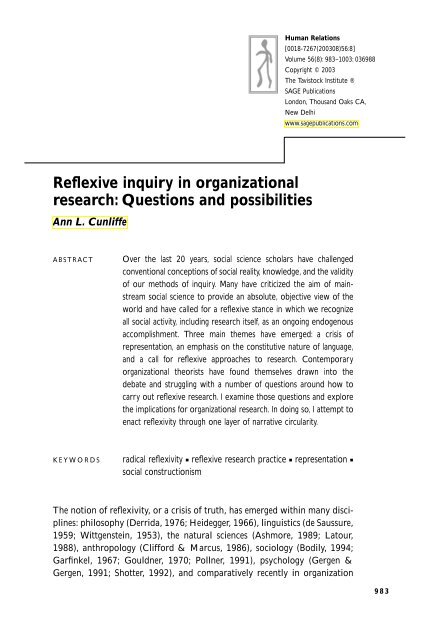

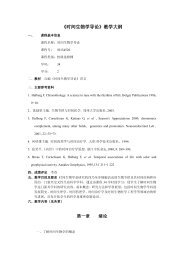
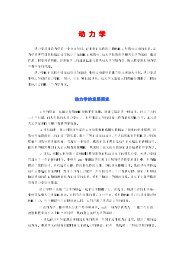
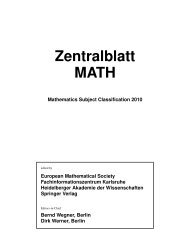
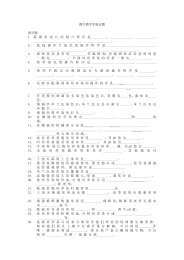
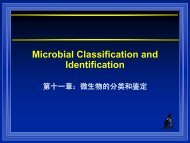




![第10 ç« æ¢ç弯æ²åºåMPa 30 MPa 36 kN/m 5.4][ = q = ][q](https://img.yumpu.com/29939822/1/184x260/c10-c-aeca-1-4-aeaampa-30-mpa-36-kn-m-54-q-q.jpg?quality=85)

